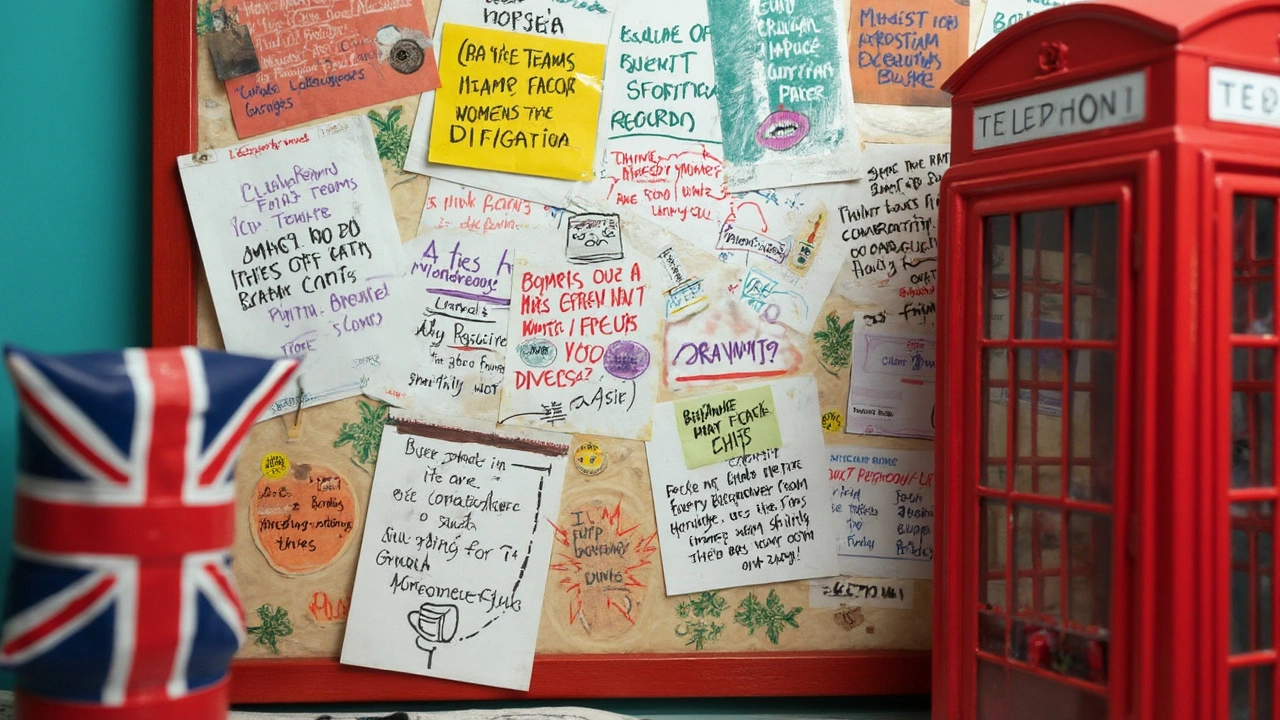Escape Room Success Rates: Why Most People Don’t Make It Out in Time
 Jun, 28 2025
Jun, 28 2025
If you’ve ever tried an escape room—or are considering it—you probably imagine a pulse-pounding race against the clock, your friends yelling out numbers, clocks ticking down to that final second. And somewhere in the chaos, someone always wonders: “Wait, do most people fail escape rooms?” The truth might surprise you more than any hidden clue or twisting lock combination.
Escape Room Industry Stats: Just How Many People Fail?
The short answer is yes—most groups do not make it out of escape rooms before time runs out. According to data released by the Escape Room Directory in 2024, the global average success rate hovers around 30%. For harder rooms, that number drops as low as 15%. What does that mean for you and your group? Basically, you’re more likely to fail than succeed, no matter how sharp you think you are.
Here’s a look at some recent data from urban and suburban escape room venues in the US:
| City | Average Success Rate (%) | Hardest Room Success (%) |
|---|---|---|
| New York | 28 | 12 |
| Los Angeles | 35 | 17 |
| Chicago | 32 | 14 |
| Houston | 30 | 13 |
| Seattle | 33 | 16 |
The numbers tell a clear story, but stats never tell you why people fail. If you peek behind the curtain, it isn’t usually because your friends are dumber than average. Escape rooms are intentionally hard, and the creators keep a close eye on these success rates—too high, and the game is boring. Too low, players feel hopeless and stop coming back. It’s a balancing act that keeps you coming for “just one more try.”
Another interesting tidbit: certain demographics do a bit better or worse. College students as a group have slightly higher rates, while family groups with younger kids tend to stumble more often. Mixed-age teams with a good blend of logic and creativity usually land closer to the average. But there is no “winning formula.” Even all-star trivia champs have cracked under the pressure. It’s more about teamwork than personal genius.
What Makes Escape Rooms So Challenging?
Let’s be real: you walk in expecting a few riddles and some padlocks, but escape room puzzles are more layered than you’d think. You’re dealing with hidden mechanisms, misleading props, and clues that are just cryptic enough to leave you second-guessing. Most rooms toss out puzzles that require a mix of logic, pattern recognition, memory, and creative problem-solving—all at once. And then there’s the clock, flashing neon red, making even simple math seem like rocket science under pressure.
Designers use every trick in the book to trip you up. They’ll throw in red herrings (items or clues that go nowhere), or puzzles that need to be solved in a specific order, or even force you to rely on communication between teammates in separate rooms. Some rooms control the difficulty using live game masters who drop hints only when you’re well and truly stuck, but even then, you start to feel the sweat on your brow. If you’re thinking it can’t be that hard, try navigating a combination lock coded in some obscure reference to a painting on the wall—while your friend reads numbers upside down and the last five minutes tick away mercilessly.
- Puzzle diversity: Expect everything from riddles and ciphers to physical tasks or listening for strange audio cues.
- Time pressure: Most rooms give you 45 to 60 minutes—long enough to tease you but short enough to guarantee panic by minute 45.
- Hidden connections: The solution to one problem might rely on a clue you never realized mattered at the start.
- Red herrings: Useless objects to make you overthink, waste time, and argue with your friends.
If you love video games or detective stories, this mix is intoxicating. But for the average group, it means you need way more than just book smarts. You need real-time problem-solving, teamwork, and the ability not to crack under pressure.

Top Reasons Most People Don’t Escape in Time
So why do most people fail escape rooms? Short answer: human nature. But let’s break it down. First off, communication breakdowns are huge. Ever been in a room where one person tries to brute-force every lock, while someone else ignores them entirely and starts dismantling the furniture? Yeah. That’s a recipe for wasted minutes and frayed nerves. People often hoard clues or assume someone else is handling a puzzle. Hint: they usually aren’t.
Then there’s tunnel vision. Someone decides that a red bottle HAS to be important and spends fifteen minutes on it, dragging others along for the ride. Before long, half the puzzles go untouched while time slips away. A 2023 study by the University of Toronto looked at how groups in escape rooms get stuck: almost 60% of the time, it was because they fixated on the wrong thing instead of moving on quickly enough. Being willing to regroup and shift focus is everything.
Another killer is overcomplication. Escape rooms are tricky, but the puzzles themselves usually aren’t designed to require a PhD. People just tend to overthink—adding layers of meaning that aren’t there, wasting precious time. Add in time pressure, and even the best decision-makers turn into squirrels on an energy drink binge. When your team’s shouting three different theories at once, finding the real answer isn’t easy.
Finally, personality clashes can derail even the smartest group fast. If you’ve got one person who insists on leading and ignores everyone else’s ideas, that’s an easy way to burn time. The most successful teams work together, split up tasks, and call out their clues for everyone to hear. When egos get in the way, the clock is your enemy.
- Poor communication
- Tunnel vision on red herrings
- Overcomplicated solutions
- Ignoring team input
- Failure to manage time
Recognizing these pitfalls is step one. And yes, you can totally get better—with a bit of practice and the right attitude.
Tips to Improve Your Chances of Beating an Escape Room
If you’re aiming to beat those tough odds and post your cheesy “WE ESCAPED!” pic, you need to be tactical. Here’s how veteran escapees keep their cool (and snag their place on the wall of fame):
- Communicate out loud. Say everything you see, hear, and try. Don’t keep ideas to yourself, even if they sound dumb.
- Divide and conquer. Split up puzzles so everyone’s working, but keep checking in so nothing slips through the cracks.
- Don’t fixate. If something isn’t working after a minute or two, move on. There’s no shame in circling back later.
- Listen as much as you talk. Sometimes the best idea comes from quiet team members, especially if you’re feeling stumped.
- Use your clues wisely. Most escape rooms allow 2-3 hints. If you’re running out of time, take them! No one’s judging.
- Scan the room methodically. Search every corner, under every object, but do it fast and mark where you’ve already checked.
- Organize what you find. Put solved clues and keys in one spot, and make a habit of calling out what’s already used.
- Stay calm. If you panic, mistakes multiply. Take a breath, focus, and get back to basics.
- Play a variety of rooms and themes. Each has a unique style of puzzle, so the more you try, the more tricks you’ll learn.
- Debrief after failures. Sounds nerdy, but talking through what tripped you up helps you kill it next time.
Mastering these basics can bump your team’s odds from that bleak 30% to closer to 50% over time—a massive difference for regular players. That’s exactly how those local legends become the fastest solvers in the database. They aren’t always smarter, just more organized and cool-headed.

Why Escape Rooms Are More Fun When You Lose
Here’s the thing nobody tells you: losing an escape room can be way more memorable than winning. Most people fail, but that’s what keeps them coming back. The stories you end up telling are always about the hilarious missteps, the missed clues right in front of your nose, or the last-second scramble that almost worked. (Nobody brags about blowing through a room in twenty minutes on easy mode.)
Escape rooms are built for shared experience, not just brainy bragging rights. That moment when your team is laughing at some wild theory or in full-on panic mode, racing to beat the countdown? That’s the stuff you’ll remember long after the game is done. Even big-name celebrities and athletes have failed loudly and publicly in escape rooms—remember the 2022 NBA rookie class struggling through a New York horror-themed room for charity? They couldn’t find the first key for half an hour, and they loved every second.
If you’re still wondering whether you’ll fail your next escape room challenge, the real answer is: probably yes. But that’s exactly what makes it fun. You’ll get better, you’ll have epic stories, and you’ll always want to try again. Don’t sweat the stats. The real point of escape rooms isn’t just victory—it’s about the rush, the teamwork, and the wild ride you take along the way. And if you end up locked in, well, join the club.